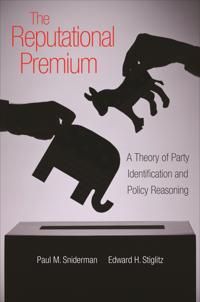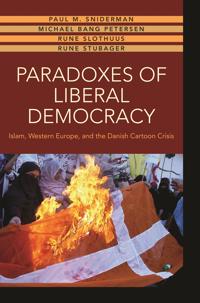Reasoning and Choice (Pocket)
avPaul M. Sniderman, Richard A. Brody, Philip E. Tetlock
ISBN: 9780521407700 - UTGIVEN: 1993-09Drawing on a multitude of data sets and building on analyses carried out over more than a decade, this book offers a major new theoretical explanation of how ordinary citizens figure out what they favour and oppose politically. Reacting against the conventional wisdom, which stresses how little atte[...]
Outsider, The: Prejudice and Politics in Italy (Övrig)
avPaul M. Sniderman, Pierangelo Peri, Rui J.P.De Figueiredo, Thomas Piazza
ISBN: 9780691094977 - UTGIVEN: 2002-07-29One of the most wide-ranging studies of prejudice undertaken in a decade, The Outsider combines new research methods and rich analysis to upend many of our assumptions about prejudice. Noting that hostility toward immigrants has been on the rise throughout Western Europe, Paul Sniderman and his team[...]
When Ways of Life Collide (Häftad)
avPaul M. Sniderman, Louk Hagendoorn
ISBN: 9780691141015 - UTGIVEN: 200902In 2004, Dutch filmmaker Theo van Gogh was brutally murdered on a busy Amsterdam street. His killer was Mohammed Bouyeri, a twenty-six-year-old Dutch Moroccan offended by van Gogh's controversial film about Muslim suppression of women. The Dutch government had funded separate schools, housing projec[...]
Reputational Premium, The: A Theory of Party Identification and Policy Reasoning (Övrig)
avPaul M. Sniderman, Edward H. Stiglitz
ISBN: 9780691154145 - UTGIVEN: 2012-07-03"The Reputational Premium" presents a new theory of party identification, the central concept in the study of voting. Challenging the traditional idea that voters identify with a political party out of blind emotional attachment, this pioneering book explains why party identification in contemporary[...]
The Reputational Premium (Häftad)
avPaul M. Sniderman, Edward H. Stiglitz
ISBN: 9780691154176 - UTGIVEN: 201207"The Reputational Premium" presents a new theory of party identification, the central concept in the study of voting. Challenging the traditional idea that voters identify with a political party out of blind emotional attachment, this pioneering book explains why party identification in contemporary[...]
Paradoxes of Liberal Democracy (Inbunden)
avPaul M. Sniderman, Michael Bang Petersen, Rune Slothuus
ISBN: 9780691161105 - UTGIVEN: 2014-08In 2005, twelve cartoons mocking the prophet Mohammed appeared in the Danish newspaper Jyllands-Posten, igniting a political firestorm over demands by some Muslims that the claims of their religious faith take precedence over freedom of expression. Given the explosive reaction from Middle Eastern go[...]
Prejudice, Politics, and the American Dilemma (Pocket)
avPaul M. Sniderman, Philip E. Tetlock, Edward G. (EDT) Carmines
ISBN: 9780804724821 - UTGIVEN: 1995-01Half a century since the publication of An American Dilemma, Gunnar Myrdal's seminal work on race in America, this book contributes to a fresh understanding of this dilemma by viewing the issues of race as they are now. 'This extremely important book has a number of strengths: most important, its in[...]
The Clash of Rights (Pocket)
avPaul M. (EDT) Sniderman, Joseph F. Fletcher, Peter H. Russell
ISBN: 9780300069815 - UTGIVEN: 1996-10Why do citizens in pluralist democracies disagree collectively about the very values they agree on individually? This text highlights the inescapable conflicts of rights and values at the heart of democratic politics.[...]
Studies in Public Opinion (Pocket)
avWillem E. (EDT) Saris, Paul M. (EDT) Sniderman, Willem E. (EDT) Saris
ISBN: 9780691119038 - UTGIVEN: 2004-07In democratic societies, opinion polls play a vital role. But it has been demonstrated that many people do not have an opinion about major issues--the "nonattitudes" problem. Also, the framing of questions in different ways can generate very different estimates of public opinion--the "framing" effec[...]











